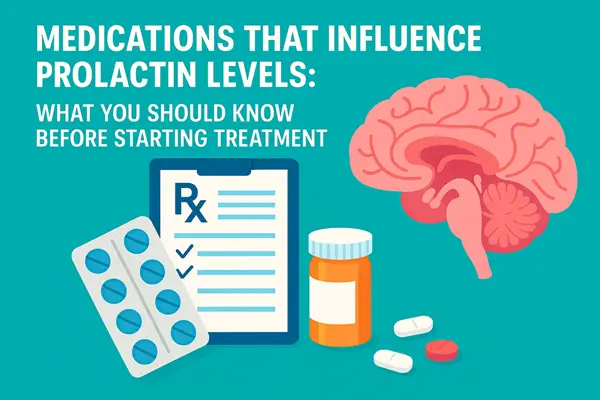Prolactin is a hormone produced by the pituitary gland, a small structure at the base of the brain. Its main role is to stimulate milk production after childbirth, but it also contributes to reproductive health, metabolism, mood regulation, and immune function. Because it influences so many systems, even small shifts in prolactin levels can cause noticeable changes in wellbeing.
High prolactin (hyperprolactinaemia) may lead to symptoms such as irregular periods, reduced fertility, breast tenderness, or unwanted milk production. Low prolactin is less common but can also cause difficulties, particularly in breastfeeding or in maintaining hormonal balance. One of the most important factors that can alter prolactin levels is medication.
Before starting a new treatment, it helps to understand how certain drugs may raise or suppress prolactin, what side effects to watch for, and why monitoring is essential.
Medications that can raise prolactin levels
Certain medicines affect dopamine, the brain chemical that normally keeps prolactin in check. When dopamine is blocked, prolactin tends to rise.
Antipsychotics
Drugs such as risperidone, haloperidol, and amisulpride are widely prescribed for conditions like schizophrenia, bipolar disorder, and severe depression. These medicines block dopamine receptors, which can remove the natural brake on prolactin release. Possible side effects include menstrual disturbances, reduced libido, breast enlargement, and milk production in people who are not breastfeeding.
Antidepressants
Some antidepressants, particularly tricyclic antidepressants and selective serotonin reuptake inhibitors (SSRIs), can raise prolactin levels in a subset of patients. Although not as common as with antipsychotics, this effect may still occur and can be missed if hormone levels are not checked.
Anti-nausea and gut motility medicines
Metoclopramide and domperidone are sometimes prescribed to treat nausea, vomiting, or slow digestion. Because they block dopamine receptors, they can significantly increase prolactin, sometimes leading to galactorrhoea (unexpected milk flow) or menstrual changes.
Blood pressure and heart medications
Verapamil, a calcium channel blocker, has been linked with raised prolactin in certain patients. While this is not a universal effect, it is worth being aware of if unexplained hormonal changes occur after starting treatment.
Medications that can lower prolactin levels
In some situations, medicines are intentionally prescribed to reduce prolactin levels, especially when the hormone is abnormally high due to a benign pituitary tumour called prolactinoma.
Dopamine agonists
Drugs such as bromocriptine and cabergoline mimic the action of dopamine, directly suppressing prolactin secretion. These medicines are highly effective and often bring prolactin levels back into the normal range, restoring fertility and resolving other symptoms.
Parkinson’s disease treatments
Some medicines used in Parkinson’s disease, such as levodopa, also stimulate dopamine activity and may lower prolactin levels. While this is not always the main goal of treatment, it can influence hormonal balance.
Why monitoring prolactin levels is important
Not everyone who takes these medications will experience a problem, but prolactin changes are common enough that monitoring is recommended. Because high or low prolactin may not always cause obvious symptoms, a simple blood test is often the only way to detect changes early.
Monitoring is particularly important if you experience:
- Irregular or absent menstrual periods
- Unexpected milk flow from the breasts
- Breast tenderness or enlargement
- Reduced libido or erectile difficulties
- Unexplained headaches or vision changes, which could signal a pituitary issue
Regular follow-up allows healthcare providers to adjust doses, switch to alternatives, or investigate other underlying causes if necessary.
Side effects to be aware of
When prolactin levels rise due to medication, side effects may include:
- Breast changes such as enlargement, tenderness, or milk secretion
- Menstrual irregularities, including missed or shortened cycles
- Reduced fertility and sexual function
- Weight changes and fatigue
- Emotional shifts such as anxiety or low mood
When prolactin levels fall too low, difficulties with breastfeeding may occur, along with potential impacts on hormonal balance.
Can prolactin return to normal after stopping a medication?
Often, prolactin levels gradually return to normal once the medicine is reduced or discontinued. The timescale varies depending on the drug and how long it was taken. Some people notice improvements within days or weeks, while others may take several months to stabilise.
However, no one should stop taking medication suddenly without medical advice. Abrupt withdrawal, especially with psychiatric drugs, can cause serious health risks. Always consult your doctor or pharmacist before making changes.
How healthcare providers manage prolactin changes
If a drug is found to be altering prolactin levels in a way that causes problems, your healthcare provider may:
- Adjust the dosage to minimise side effects
- Switch to another medication with fewer hormonal effects
- Add a dopamine agonist in certain cases, under careful supervision
- Refer you for an endocrinology assessment if a pituitary condition is suspected
Practical tips for patients
- Keep track of any menstrual changes, breast symptoms, or sexual health concerns after starting a new medicine.
- Mention these changes during routine check-ups, even if they seem minor.
- Ask whether prolactin should be monitored as part of your treatment plan.
- Never stop or alter medication on your own, as this can cause more harm than benefit.
Frequently asked questions
Which medicines most commonly raise prolactin?
Antipsychotics such as risperidone and haloperidol, along with metoclopramide and domperidone, are among the most common.
Are high prolactin levels always dangerous?
Not always, but persistent high levels can cause fertility issues, menstrual problems, and sometimes bone thinning if left untreated.
Do men need to worry about prolactin changes?
Yes. High prolactin in men can lead to reduced testosterone, erectile dysfunction, breast enlargement, and low mood.
Can lifestyle changes help control prolactin?
Stress reduction and good sleep can support hormonal balance, but if a medication is driving prolactin changes, medical guidance is usually required.
How often should prolactin be checked?
This depends on the medication and your symptoms. Some patients need monitoring every few months, while others may only require annual checks.
Final thoughts
Prolactin plays a crucial role in reproduction, mood, and overall health. Because so many common medications influence its levels, it is important to be aware of potential effects before starting treatment. With proper monitoring, side effects can often be managed or prevented, allowing you to continue receiving the benefits of your medication without unnecessary risks. If you have concerns about how your treatment may affect prolactin, speak to your doctor or pharmacist. Professional guidance ensures that your health is protected and your treatment remains both safe and effective.


